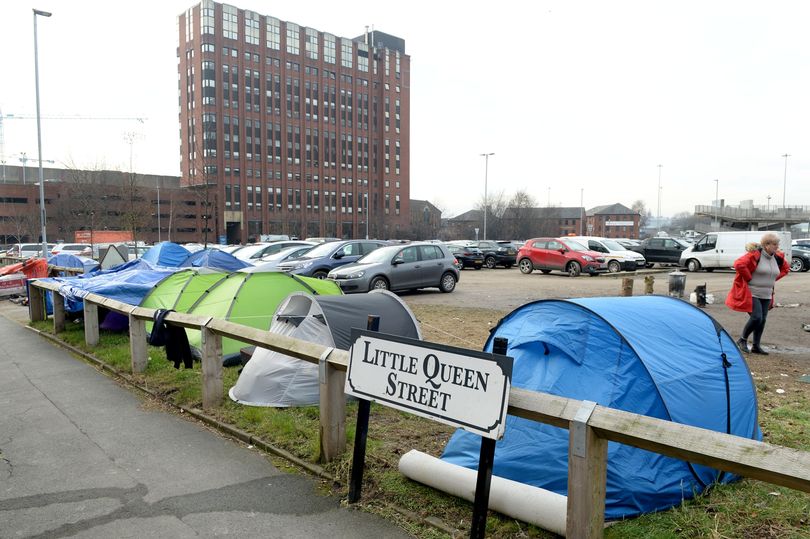A project which aims to provide homeless people with resources and support in order to improve their situation was stopped by Leeds City Council last year. Alex Rimmer takes a look.
David Hedley, who runs the ‘Homeless Leeds Support’ charity, has spoken out on Twitter and other social media platforms about his outrage that one of his projects has been blocked by Leeds City Council. Hedley ran a humanitarian aid camp in 2019 which was based in a disused car park, with the aim being to aid homeless people in Leeds find their way into temporary and permanent accommodation, whilst also providing immediate access to essential aid.
However, Leeds City Council has blocked this aid via an injunction which they put into action at the start of January. Despite the statistical success of the ‘tent camp’, the council has provided several reasons for their refusal for a repeated service and their steps towards legal action. The council claimed that by providing a location for services to rough sleepers, the disused car park then became a “serious public nuisance”. The council reported that the food, warm clothing and shelter was accompanied by used drug paraphernalia and rubbish left on the site.
They also reported that the safety of those the charity aims to care for during this project is far from guaranteed, as previously violence erupted amongst both the residents of the camp itself and members of the public who attacked the site. The council also claimed that the charity did not follow correct health and safety procedures during food preparation and, due to the needles found at the site, they concluded that there was a serious risk of both infection and contamination.

However, despite the drawbacks of 2019’s Tent City, Hedley believes that it was an overall success due to the fact that some were able to leave their lives on the streets and live in a form of accommodation. The charity’s founder had also taken steps to ensure that the problems the council reported would not happen again.
Hedley had planned to employ six security guards who would work on a voluntary basis over the twelve days of the project’s duration. He’d also planned for them to be equipped with radios and protect “the camp from drugs, alcohol and drug dealers”. It seems that the council have not taken confidence from Hedley’s preventative methods, and believe that there is still an overwhelming risk of anti-social behaviour and violence at the chosen site.
After losing the injunction set against the humanitarian aid camp, an online petition was set up to try and gain the public’s support.
The brief on the website describes the injunction as a step which has prevented the homeless people from Leeds receiving the support that they desperately need. The site lists explicitly the forms of care that they claim rough sleepers have been denied such as medical provision, hot meals and guidance to find accommodation.
The description also claims the location which he planned to utilise for his project is now going to be sold by the council to build new properties. As such, there has been the suggestion that the council’s motivation for denying this project was financially driven, and that the wellbeing of rough sleepers in the city is not the priority of the council.
Hedley describes the alleged financial factor in this injunction as an “absolute insult to the people who are on the streets needing a place to call home.” It should be noted, though, that the site in question has been up for sale since March 2019.
Hedley hopes that by taking to social media to spread the message of the injunction and encourage others to sign his petition, the council will take further steps to give rough sleepers the aid they require through projects like his tent city.
Hedley also uses his Twitter platform to show both the success of his projects and the need for aid to the homeless of Leeds, as he often posts images of places of refuge being overwhelmed. This demonstrates to those following his cause that there is a requirement for further action in Leeds. Images such as this may place pressure on Leeds City Council to replace tent city with other means of aid which can be conducted in a safe and controlled environment.
A real busy night feeding the less fortunate in leeds over 90 people attended to recieve hot food drinks clothing and vital essentials . pic.twitter.com/hrPGPZAvoQ— David hedley (@HedleyDhedley78) February 1, 2020
These events have led various spokespeople from the council to remind the public of their Street Support Team initiative. They claim that support is continuously available for rough sleepers, therefore potentially dangerous aid projects are not required.
They also said that individuals working outside of the council can act as a detrimental factor in the support of rough sleepers as they may “undermine progress” and “put peoples’ ongoing rehabilitation at risk”. This statement goes a long way in explaining the intense clash between Leeds City Council and homeless charity leader David Hedley, as Hedley has clearly stepped outside of the councils attempt to focus resources in a dynamic fashion.
When contacted for further comment, Debra Coupar, Leeds City Council’s Executive Board Member for Communities, stated:
“We welcome the undertaking given by Mr Hedley that he will not seek to organise an illegal encampment similar to that of what we saw last year. Mr Hedley has indicated previously that he feels he cannot work with partners across the city which provide meaningful support to anyone who may be rough sleeping in Leeds. We would more than welcome the chance to listen to his ongoing concerns, and outline the work being undertaken on homelessness and rough sleeping, whilst at the same time, exploring any opportunities where he might be able to support with this.”
Image: The 2019 Tent City, Julian Hamilton/Daily Mirror

